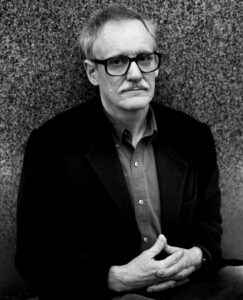Peter Schjeldahl will be missed

Peter Schjeldahl, courtesy The New Yorker
I was delighted when Jim Mott sent me some excerpts from Peter Schjeldahl’s sayonara at The New Yorker, inaugurating his retirement. I spend so little time reading magazines now; I missed it. May he move on to write a book, if he survives his battle with cancer long enough. The prospects don’t sound good. He’s always been my favorite art critic. I didn’t realize he had a faith, but it sounds as if it didn’t emerge until he quit drinking. Maybe I am reading too much into a couple sentences. In this cultural climate, it’s a brave move, albeit a bit quieter than Kanye’s, to offer a shout out to Christianity, which now seems to be equated unfairly with deplorable politics. It feels as if we are living in the cultural Dark Ages. (It helps if you quote Simone Weil; that “cherry on top” is a nice touch.) His judgments have almost always struck me as unimpeachable and delivered with wry self-awareness, meaning humility. The humility grows here to the proportions I consider de rigueur for an artist, and especially a critic. I agree with nearly any self-skepticism: I don’t know much, and maybe someday, if I’m good, I’ll know nothing, along with Socrates. Danto often has a similar tone of implied disclaimer: Well, this is how it looks to me, I could be wrong, but I don’t think so. But Schjeldahl’s doubt is less philosophical and more personal, hence more engaging and intimate. His first paragraph below says precisely what I recognized a few months ago after my father’s death, when I came across the Google street view photograph of the house my wife and I lived in during the first few years of our son and daughter’s childhood–the photograph did everything a work of art ought to do, and it was simply the tiny artifact of some camera mounted on top of a car moving past the house in the most impersonal way possible. It was essentially a surveillance shot. But it contained more than my world from those years; it gave me a window into the entire world, emotionally, imaginatively, and in some other way I don’t have language to pin down. I had been punished into receptivity at that point, granted, but there you go. That’s how it works. Danto would smile at the fact that the Google street view shot was art for me right then and there–though it would contradict his argument about the need for meaning–but it’s exactly what Schjeldahl is getting at.
From Schjeldahl’s farewell, courtesy Jim’s email:
Comments are currently closed.